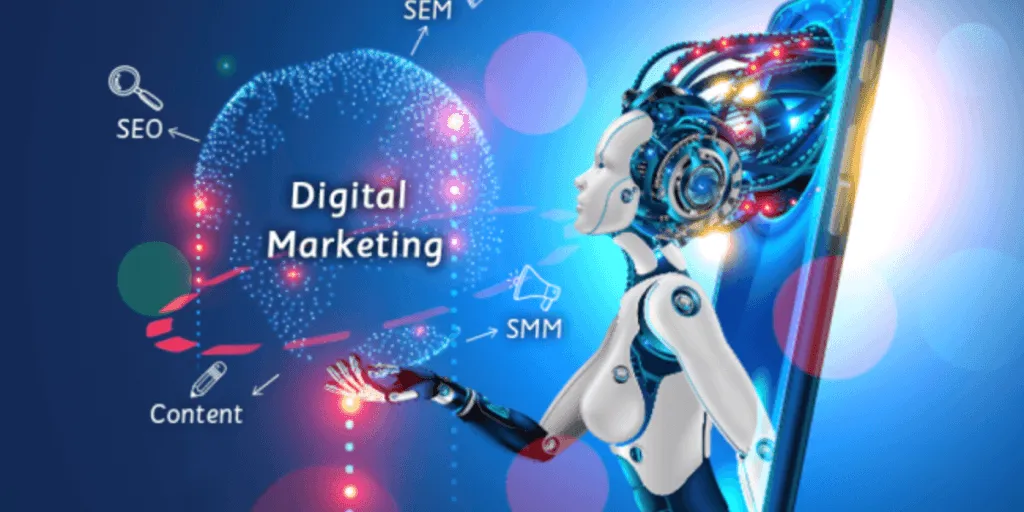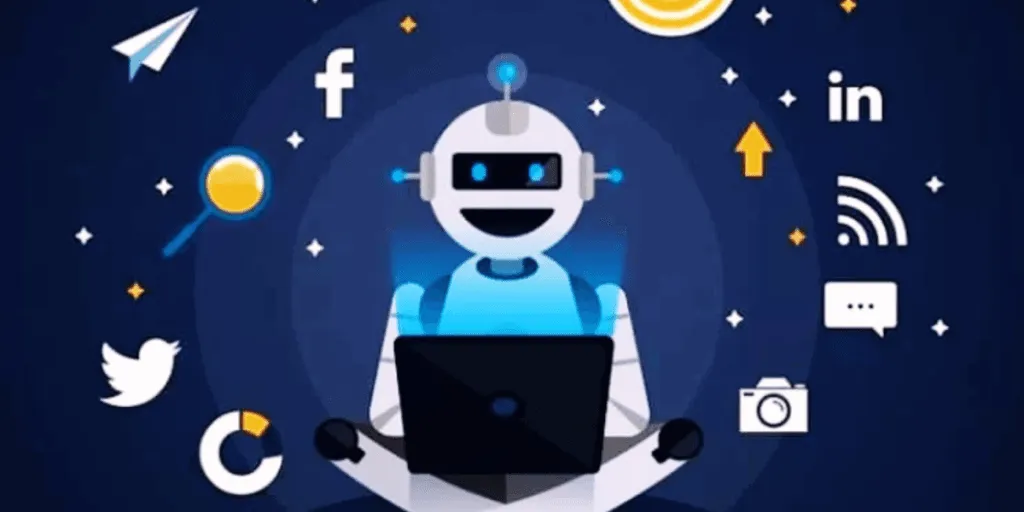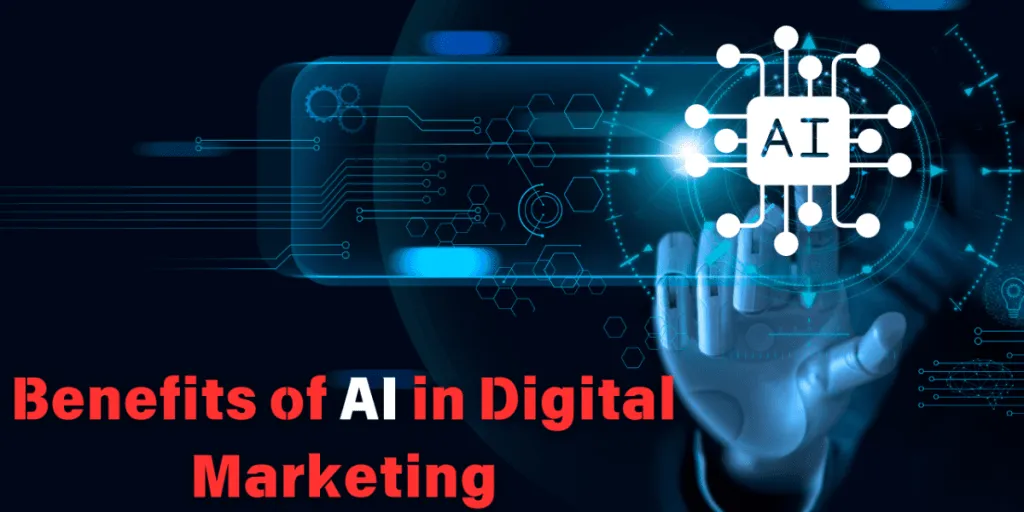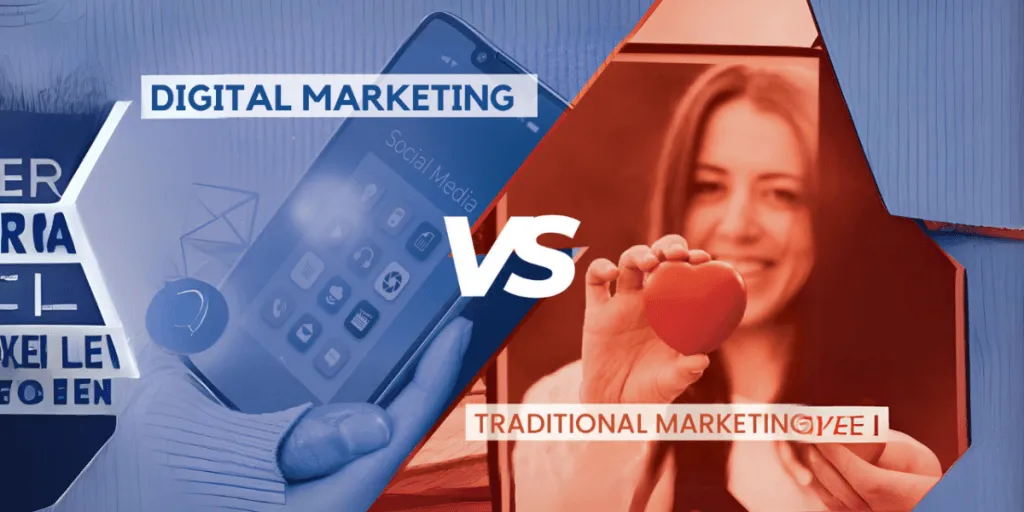AI in digital marketing involves applying algorithms, machine learning, and data analytics to optimize marketing strategies and streamline processes. With the help of AI technologies, marketers can gain valuable insights into consumer behavior, believe in upcoming trends, and streamline their tasks, resulting in highly efficient and impactful campaigns.
In today’s fast-paced digital world, where there is a wealth of consumer data available, AI in digital marketing offers powerful tools to analyze this data and uncover valuable insights. Companies utilize AI technology to tailor customer experiences, enhance advertising tactics, and enhance decision-making procedures. In today’s competitive landscape, staying ahead of the game requires embracing the power of AI in digital marketing.
“AI is revolutionizing digital marketing by making customer
experiences more personalized and efficient.”
The Evolution of AI in Digital Marketing

The evolution of AI in digital marketing started with simple algorithms employed for data analysis. In recent years, there have been significant advancements in machine learning and natural language processing, which have paved the way for more sophisticated applications. The rise of big data and cloud computing has further accelerated the integration of AI into marketing.
Key milestones include the development of AI-powered chatbots, the introduction of programmatic advertising, and the emergence of predictive analytics. These innovations have transformed how businesses interact with customers and optimize their marketing efforts.
Core AI Technologies in Digital Marketing
- Machine Learning
Machine learning enables systems to learn from data and improve over time. In digital marketing, it is used for tasks like customer segmentation, predictive analytics, and recommendation engines.
- Natural Language Processing (NLP)
NLP allows machines to understand and interpret human language. It is essential for chatbots, sentiment analysis, and voice recognition technologies.
- Predictive Analytics
Predictive analytics involves using historical data to predict future outcomes. It helps marketers anticipate customer behavior and tailor campaigns accordingly.
- Chatbots and Virtual Assistants
Chatbots and virtual assistants use AI to interact with customers in real-time, providing instant support and information.
- Computer Vision
Computer vision enables machines to interpret visual information. It is used in marketing for visual search, image recognition, and content curation.
Applications of AI in Digital Marketing

- Personalization and Customer Experience
AI personalizes customer experiences by analyzing data on consumer behavior, preferences, and interactions. This allows businesses to deliver tailored content, product recommendations, and personalized offers.
- Content Creation and Curation
AI in digital marketing tools can generate content, such as product descriptions and social media posts, and curate relevant content for audiences. This saves time and ensures consistency in messaging.
- Email Marketing Automation
AI automates email marketing campaigns by segmenting audiences, optimizing send times, and personalizing content, leading to higher engagement rates.
- Social Media Management
AI tools manage social media accounts by scheduling posts, analyzing performance metrics, and even generating content, allowing marketers to maintain an active online presence.
- Search Engine Optimization (SEO)
AI enhances SEO strategies by analyzing search engine algorithms, identifying keyword opportunities, and optimizing content for better rankings.
- Pay-Per-Click (PPC) Advertising
AI optimizes PPC campaigns by analyzing data, adjusting bids, and targeting the right audiences, maximizing return on investment (ROI).
- Data Analytics and Insights
AI processes vast amounts of data to provide insights into customer behavior, market trends, and campaign performance, enabling data-driven decision-making.
- Customer Relationship Management (CRM)
AI-powered CRM systems manage customer interactions, track engagement, and automate follow-up actions, improving customer retention and satisfaction.
Benefits of AI in Digital Marketing

- Enhanced Efficiency and Productivity
AI automates repetitive tasks, allowing marketers to focus on strategic activities and creative processes.
- Improved Customer Insights
AI analyzes customer data to provide deep insights into consumer preferences and behaviors, enabling personalized marketing strategies.
- Better Targeting and Segmentation
AI enables precise targeting by analyzing demographic, behavioral, and psychographic data, ensuring that campaigns reach the right audience.
- Cost Reduction
Automation and optimization through AI reduce operational costs and increase the efficiency of marketing campaigns.
- Real-Time Data Analysis
AI processes data in real time, providing instant insights and enabling quick adjustments to marketing strategies.
- Increased ROI
By optimizing marketing efforts, AI helps businesses achieve higher ROI through more effective campaigns and better resource allocation.
Challenges and Limitations of AI in Digital Marketing
- Data Privacy Concerns
The use of AI in digital marketing raises concerns about data privacy and the ethical handling of consumer information.
- High Implementation Costs
Implementing AI technologies can be costly, especially for small businesses with limited budgets.
- Complexity and Technical Barriers
AI systems require technical expertise to implement and maintain, posing a challenge for organizations without specialized staff.
- Ethical Considerations
The use of AI in marketing raises ethical questions about transparency, fairness, and the potential for manipulation.
- Dependence on Data Quality
AI’s effectiveness relies heavily on the quality of data it processes. Poor data quality can lead to inaccurate predictions and decisions.
Latest Innovations in AI for Digital Marketing
- AI-Driven Content Generation
Tools like GPT-4 generate high-quality content, from blog posts to social media updates, streamlining content creation processes.
- Voice Search Optimization
As voice-activated devices become more popular, optimizing content or voice search is crucial for staying relevant in search engine rankings.
- Augmented Reality (AR) and Virtual Reality (VR) in Marketing
AR and VR technologies create immersive experiences, allowing customers to interact with products virtually before making a purchase.
- Programmatic Advertising
AI automates the buying and selling of ad space, optimizing ad placements and targeting in real-time.
- AI-Powered Customer Support
AI-powered chatbots provide instant customer support, resolving issues and answering queries around the clock.
Future Prospects of AI in Digital Marketing
Integration with Other Emerging Technologies
AI is expected to integrate with technologies like blockchain and IoT, enhancing data security and personalized marketing experiences.
Future Trends and Predictions
Future trends include the rise of hyper-personalization, AI-driven video content, and the increased use of AI in market research.
The Role of AI in Shaping Consumer Behavior
AI will continue to influence consumer behaviour by providing personalized experiences and shaping preferences through targeted marketing.
Comparative Analysis: AI vs. Traditional

Marketing Methods
- Efficiency and Speed
AI-driven marketing is faster and more efficient, processing large amounts of data and automating tasks.
- Cost-Effectiveness
While initial implementation costs can be high, AI can reduce long-term costs through automation and optimization.
- Accuracy and Precision
AI offers higher accuracy in targeting and segmentation, leading to more effective campaigns.
- Flexibility and Adaptability
AI systems can quickly adapt to changes in consumer behaviour and market trends, providing real-time adjustments to strategies.
Examples and Success Stories
Examples of brands like Amazon, Netflix, and Coca-Cola leveraging AI to enhance customer experiences and optimize marketing strategies.
“In digital marketing, AI goes beyond automation,
enabling smarter, data-driven strategies.”
Conclusion
AI has revolutionized digital marketing by enhancing efficiency, personalizing customer experiences, and providing valuable insights. The future of AI in digital marketing looks promising, with continuous advancements and integration with other technologies. Businesses that embrace AI will likely stay ahead in the competitive landscape.
Frequently Asked Questions (FAQs)
1. What is AI in digital marketing?
AI in digital marketing refers to using advanced technologies like machine learning and data analysis to improve marketing strategies. It helps businesses understand customer preferences, predict trends, and automate tasks to make campaigns more effective.
2. How does AI improve customer experiences in marketing?
AI improves customer experiences by analyzing data to personalize content. For example, it can suggest products based on your past purchases or customize ads to match your interests, making the marketing more relevant and engaging.
3. What are some common AI tools used in digital marketing?
Common AI tools in digital marketing include chatbots, which help answer customer questions instantly, and predictive analytics, which forecasts customer behavior. AI also helps automate tasks like sending personalized emails and optimizing ad campaigns.
4. What are the benefits of using AI in marketing?
AI helps marketers by automating repetitive tasks, improving customer insights, and making targeting more accurate. It also reduces costs and increases efficiency by analyzing data quickly, resulting in better decision-making and higher returns on investment (ROI).




